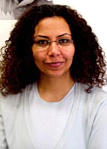With tear gas and rubber bullets raining down on protesters in Tahrir Square, Rabab el-Mahdi attempted to save her suffocating friend’s life.
Braving armed guards and panicked crowds, she finally arrived at the hospital and delivered her friend to safety just after midnight on a day in late January of this year.
Six months after that event, el-Mahdi, along with fellow activist Jawad Nabulsi, reflected on the events that have become known as the Arab Spring to a crowd of 180 at the Hammer Museum on Wednesday.
El-Mahdi, an associate professor of political science at the American University in Cairo, was both a participant and organizer of the 18 days of protests that culminated in the resignation of Egyptian President Hosni Mubarak and attempted to usher an era of democracy in Egypt.
Growing up in a politicized family, el-Mahdi said she developed a yearning for social justice early in her life. At age 18, she joined the Egyptian Progressive Youth Movement as well as various leftist political groups opposing the corruption and injustice of the Mubarak regime.
“You cannot be in Egypt and not be politicized,” el-Mahdi said.
Though the Mubarak regime was overthrown, el-Mahdi said the revolution is far from over.
Unrest in Egypt continues because of delays in the trials of former President Mubarak, key regime figures and police officers accused of murders, el-Mahdi said.
Though democratic elections in September are a step forward, el-Mahdi said she remains suspicious of the military government established in the wake of Mubarak’s departure.
James Gelvin, a UCLA professor who specializes in modern Middle Eastern history, expressed similar concerns about Egypt’s new military government.
“The military stepped up in both Egypt and Tunisia and no fundamental change has taken place,” Gelvin said.
Because of its extensive influence in Egypt’s economy, a military government in Egypt is far more interested in maintaining the economic status quo than instituting progressive reform, he added.
Meanwhile, Nabulsi, an Egyptian entrepreneur, is currently working to revitalize Egypt’s economy through developmental projects in low-income communities.
A successful businessman prior to the revolution, Nabulsi chose to join his fellow citizens when they took to the streets against Mubarak’s dictatorial regime. He set up an emergency call center for those injured in the uprising and lost an eye during his efforts to help in the protests.
He is currently combating Egypt’s high rate of unemployment, one of the main causes of unrest during the latter years of the Mubarak regime.
Nabulsi is also organizing a music festival in Cairo. Through the festival, he hopes to restore confidence and a sense of normality to the embattled capital, in addition to monetary revenue.
“Egypt needs a different economic system that caters to the Egyptian people,” el-Mahdi said.
Nabulsi particularly aims to bring hope and security to Egypt’s young people, who played pivotal roles in the revolution, since about 70 percent of Egypt’s population is currently under thirty and lived under Mubarak their entire lives.
Jimmy Recinos, a student at Pasadena City College who attended the event, said he was inspired by el-Mahdi and Nabulsi’s struggles, but was disappointed that few young people attended the event. Recinos said young people in the United States could learn from the personal experiences and struggles of Egyptian activists.
In a question-and-answer session after the event, el-Mahdi and Nabulsi shared the view that, like Egypt and Tunisia, all Arab nations are on the move toward liberty and democracy.
“It’s a matter of how and when,” Nabulsi said. “Every single Arab feels they are being treated unjustly.”
In order for a stable, prosperous future, the entire political system must be restructured, el-Mahdi said. Popular demands include progressive taxation, universal access to health care, education, pensions and a just security force, she said.
But the path to complete reform is strewn with difficulty, Gelvin said. In Syria, the military is entrenched within the presiding regime and will not submit to popular dissent like Egypt’s military, while Libyan rebels must completely oust Muammar el-Qaddafi before any restructuring can occur, Gelvin said.
Despite the obstacles, Gelvin emphasized the importance of Middle Eastern reform on a global scale.
“This is the great public issue of our time,” he said. “It is absolutely essential that people support these movements.”
